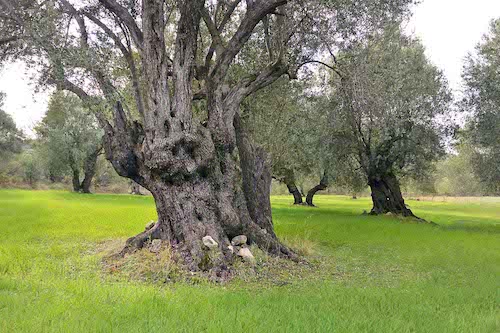For thousands of years olives have been a staple food for the Mediterranean countries. Archeological finds have proven so, as on Santorini, where olive leaf fossils have been found from some 50,000 years old. On Lesvos an old stone olive press dating from the bronze area (3.300 to 1.200 years BC) has been discovered. There are additionally Greek vases depicting olives from those centuries. A little later, in Athens and Mytilini coins were minted, decorated with olive branches.
Autumn finally chased the summer away, with falling quinces, chestnut festivals and the start of the olive harvest. Tourist masses were barely gone as the nets were spread out in the olive orchards. This year it’s an easy job, because lots of the trees are empty. Lesvos has seen its harvest shrink pretty much in line with the rest of Greece. In some other European countries harvest volume has even halved. Worldwide there is a hundreds of thousands ton shortage of olives, forcing the prices to soar dramatically.
For years Italy has been plagued by the bacteria Xylella fastidiosa, it causes the olive trees to slowly die; as evidenced in Puglia where millions of trees stand bare — wondering what had happened to them. All this because of an exotic plant imported to Italy from Costa Rica (in it was smuggled a bug with this lethal bacteria). In Spain, heat and drought are the culprits that have caused even more damage this year in the country of toreadors and olives. In Turkey and Syria there is a temporary ban on olive export, just to keep the local trade alive.
Greece last year produced some 300,000 tons of olive oil. This year the prediction is about 200,000 tons. Because of the rapid rise in the price of olives, there probably will be no olive that escapes harvest this year. Olives have become so valuable that they have become an object of desire for thieves who empty olive orchards or steal tons of olive oil from the olive presses. In Crete the situation is so bad that orchards are now protected by GPS-transmitters hidden in fake olives, that warn the owner when they get removed from the tree.
For many years now, they say that there are about 11 million olive trees on Lesvos, growing in orchards in the lowlands and on landscaped terraces in the mountains. They are mostly family businesses, one a bit bigger than the other one.
In the bare, volcanic wild west, far away from the mountains and hills that are coloured with the silver green olive trees in the south, north and east, there might be the biggest olive farm of Lesvos (at least the youngest one): the Faros Estate, nearby Sigri, owned by the Tirpidiris family. The company started 15 years ago by planting some 30,000 olive trees on 2,000 acres of land. To aid bio-diversity they used 12 different kind of olive trees and spent a fortune on palm trees and fruit trees. Recently they also built a hyper modern olive press.
All those trees form a green oasis that keeps on expanding, because Faros also buys already existing orchards in the neighbourhood. The trees are fed with biological resources, like seaweed (Posidonia), that can be found on most of the beaches of the island. It could be this salty taste that makes their olive oil Ol’eve so great. Thanks to this excellent oil the young company is among those named in the prestigious guide Flos Olei: a list of the 500 companies that produce the best extra virgin olive oil. There are only 13 Greek companies on that list, concurrence coming from 56 other countries. I had no idea that extra virgin olive oil from countries such as Ukraine, Ethiopia, Georgia, Armenia, Azerbaijan, Iraq, Afghanistan, Saudi Arabia, Yemen, Nepal. Colombia, Peru or Argentina would be amongst the 500 best of the world. The interesting Flos Olei guide opens the wonderful world of olives, hands out many prizes and informs us with cultural and historical facts of all these faraway countries and their businesses. It proves that the olive no longer belongs only to the Mediterranean region.
Homer once said that olive oil is the liquid gold. Thousands of years later he is still right. Prices have rocketed so high that many a Mediterranean has replaced olive oil with sunflower oil. Nobody will like it when the fresh and pure Greek kitchen will turn into a luxe product, nor when the olive tree will be vanished from the overheated Mediterranean countries. For the moment the Greeks will be pouring a little less of this golden green/yellow oil in to their pans when frying and better refrain from drowning their dishes with olive oil.











